SRI LANKA
Curbs and Controls
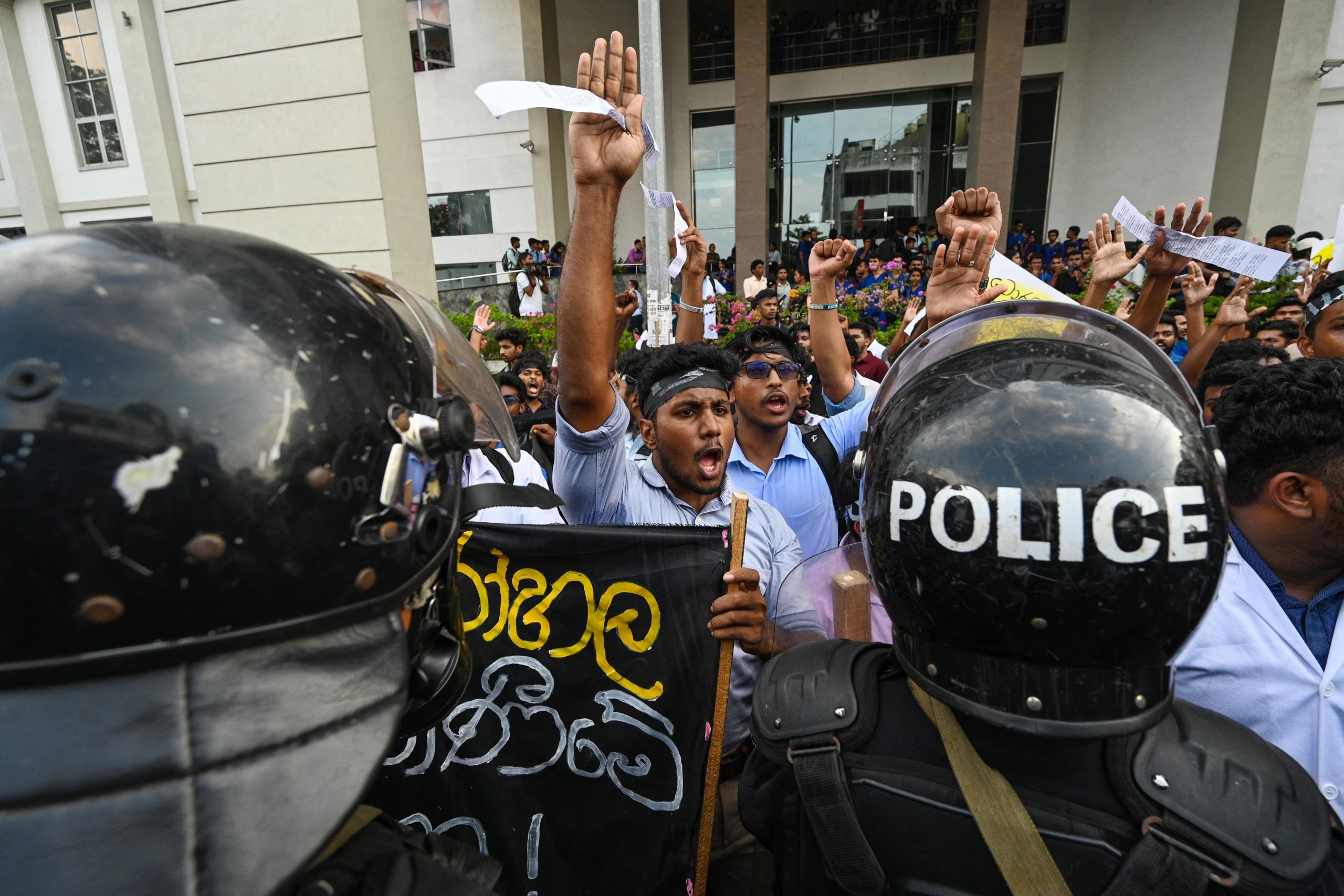
Medical students shout slogans as they protest against the government demanding the closing of private medical universities in Colombo on March 27, 2024. Sri Lanka continues to reel under the full impact of its worst financial crisis since independence, with spiralling inflation, one of world’s highest rates of food inflation and deep political unrest. Credit: Ishara S. Kodikara / AFP
Sri Lanka reeled under the full impact of its worst financial crisis since independence, with spiralling inflation, one of world’s highest rates of food inflation and deep political unrest. While people struggled to survive under these dire economic conditions, civil liberties, in particular, freedom of expression both online and offline, and the right to assembly became casualties of authoritarian politics, and those associated with the 2022 protest movement or ‘Aragalaya’ (‘struggle’ in Sinhala) became prime targets.
After massive public protests against the government’s mismanagement of the debt crisis culminated in President Gotabaya Rajapaksa’s resignation in May 2022, the government led by President Ranil Wickremesinghe unapologetically used strong-arm tactics combined with multiple laws to curb and control fundamental freedoms.
The outlawing of protest actions and the targeting of dissenters resulted in a series of arrests of protesters and activists associated with the Aragalaya for rioting and several faith leaders and artists were booked for ‘causing religious disharmony’. The administration postponed local elections indefinitely, citing lack of funds despite a court ruling in favour of holding polls, denying the public’s right to elect representatives.
The government continued its tight grip, denying the public the right to assemble, protest, and exercise the right to free speech. Several peaceful protests were attacked, with journalists, students and activists being detained and arrested. The crackdowns took place in an already stifling climate of oppression and worsening living conditions and failed to subdue a population that could no longer be silenced.
Though there is no official blocking of social media, digital activists and influencers remain prime targets of intimidation and arrest. After the brutal crackdown of the historic protest movement of 2022, the government lined up a series of repressive laws and despite large scale opposition, the Online Safety Act, a new law was passed in January 2024, effectively placing curbs on online expression.
Despite these restrictions, Sri Lankans continued to engage in digital activism. Arrests and disruptions of public protests became a regular feature, resulting in an atmosphere of fear and intimidation. Protests were both forcibly restrained by the police or banned through court orders, which interpreted peaceful protests as riots. While digital activism was opposed through a range of tactics including coercion and legal threats, creative expression equally came under attack.
The Online Safety Act, hastily passed in January 2024, sparked local and international criticism, with almost 50 petitions filed to challenge its legality. Sri Lanka’s internet freedom was significantly challenged with the state intervening to control digital activism and content critical of the regime.
A combination of laws was used to crush dissent, including the Prevention of Terrorism Act (PTA), now on to its 45th year despite repeated calls for its repeal, the Penal Code and the Police Ordinance as forerunners. Ironically, an international human rights instrument, the International Covenant on Civil and Political Rights Act (ICCPR), meant to protect against racial and religious hatred, has been weaponised in Sri Lanka to punish alleged ‘blasphemy’ and curb dissent. The year in review however, witnessed a convincing judicial pushback to excesses under the ICCPR, which might have the effect of fewer arrests in future under this law.
Media Rights Violations
Killings
Arrests
Drawing heavy criticism from home and abroad, the government replaced the Digital Security Act (DSA) with another law, the Cyber Security Act (CSA).
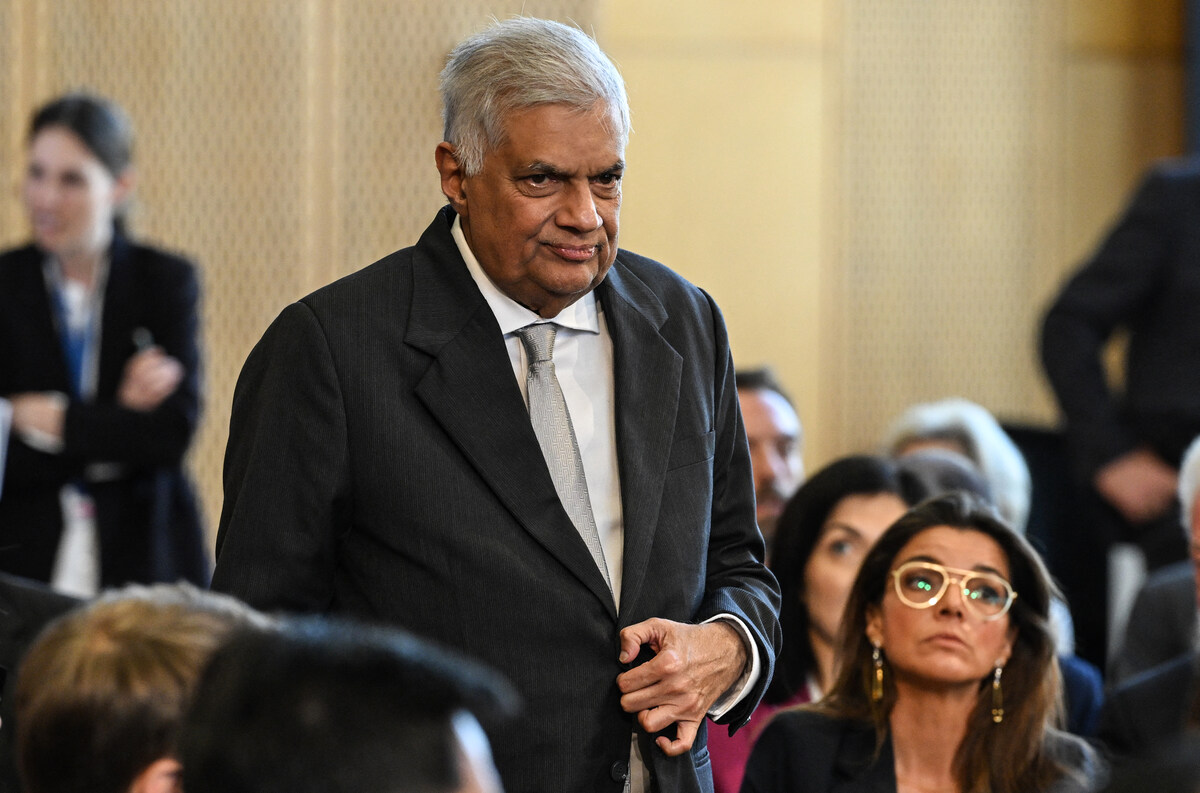
Sri Lankan President Ranil Wickremesinghe arrives for a conference in Berlin on September 28, 2023. Wickremesinghe’s government has been criticised for its crackdown on fundamental freedoms, in a move critics identify as a reaction to the ‘Aragalaya’ or struggle in 2022. The president’s home was burned through these popular rebellions. Credit: John MacDougall / AFP
Shaky media industry
Mainstream media organisations continued to experience serious challenges with the twin effects of the pandemic and the country’s financial crisis. Media houses downsized teams and resorted to cutting costs, thus reducing investment on content. The newspaper industry was hit by a lack of newsprint due to unaffordability. As a result, leading publications began to focus more on their digital versions and limit print editions.
In May 2023, the Sri Lanka Broadcasting Corporation (SLBC) shut down its regional services and introduced a voluntary retirement scheme for its employees. Similarly, 149 journalists and media workers were laid off by the state-run Associated Newspapers Ceylon Limited (ANCL).
The privately-owned media was not in much better shape. Advertising significantly decreased due to the economic crisis and several media organisations halted payment of allowances and, in some instances, payment of salaries was consistently delayed. Staff layoffs occurred in many media institutions with those retained often being called upon to put in more hours due to lean staffing. Overall, all media institutions instituted austerity measures and journalists, particularly freelancers, suffered with fewer assignments and significant delays in payments.
In contrast, digital media start-ups expanded with an increase in platforms and content creators, some of them, digital influencers. The new video content largely leaned towards views rather than news, at times blurring the line between ethical media practices and campaign journalism.
There was cross media concentration with political control or influence over many mainstream media houses, reducing the space for diversity and independent journalism. Typically, the engagement-driven digital media with concentrated audiences were seen producing content that reaffirmed their various confirmation biases.
The lack of ownership pluralism or transparency in ownership and fragmented audiences are contributing to a media sector already in crisis. There is a serious lack of choice for the audiences when it comes to mainstream operations. There is either direct political control or equally strong but undeclared political affiliations.
Unsafe and surveilled
The crackdowns and restrictions preventing journalists from having access to places and information reflect a deeply toxic political landscape that denies fundamental freedoms. Crackdowns largely focused on those associated with the Aragalaya movement, including university students, trade unionists and influencers. Many remain under surveillance.
A case in point is the assault and detention of freelance journalist Tharindu Uduwaragedara on July 28, 2023. He was apprehended while reporting on a union-led protest, and according to him, was struck several times while being taken to the police station. He was treated at the National Hospital in Colombo and granted bail on July 29. Strongly linked to the 2022 protests, Tharindu is a popular YouTuber, social media influencer and activist.
On several occasions, journalists reporting on various protests have been threatened, asked to divulge sources of information or to hand over their recording devices and footage. On several occasions, journalists were hauled before the Criminal Investigations Department (CID) to record statements on their media coverage.
In December 2023, Thangarajah Prabhakaran, editor of the Jaffna-based Uthayan daily was summoned by the Counter Terrorism Investigation Division (CTID) over the publication of a photograph of Velupillai Prabhakaran, the slain leader of the rebel Liberation Tigers of Tamil Eelam (LTTE). Dilip Amuthan, the news editor of the same publication was also questioned.
In December 2023 Mannar-based poet Ahnaf Jazeem (popularly known as Mannarmudu Ahnaf) who was arrested under the Prevention of Terrorism Act (PTA) over allegations that his poetry was ‘inciting terrorism’, was acquitted of all charges more than three years after he was arrested. The court however, refused to grant damages for wrongful confinement.
In Sri Lanka, impunity continues in the form of legal excesses and arbitrary arrests, detentions and the non-delivery of justice. There are many unresolved attacks against journalists, including high-profile cases such as that of Sunday Leader editor Lasantha Wickrematunga, assassinated in 2009 in Colombo. There is even less interest in addressing incidents that occurred in the former conflict zones. On October 4, 2023, activist Sandya Ekneligoda marked the 5000th day of the disappearance of her husband cartoonist Prageeth Ekneligoda, a sharp reminder of Sri Lanka’s lack of commitment to the delivery of justice. While the case saw some progress under the government of Maithripala Sirisena, the return to power of the Rajapakse family in 2019 once more saw barriers to justice, with the government’s refusal to prosecute ‘war heroes’ allegedly involved in the crime.
Advertising significantly decreased due to the economic crisis and several media organisations halted payment of allowances and, in some instances, payment of salaries was consistently delayed.

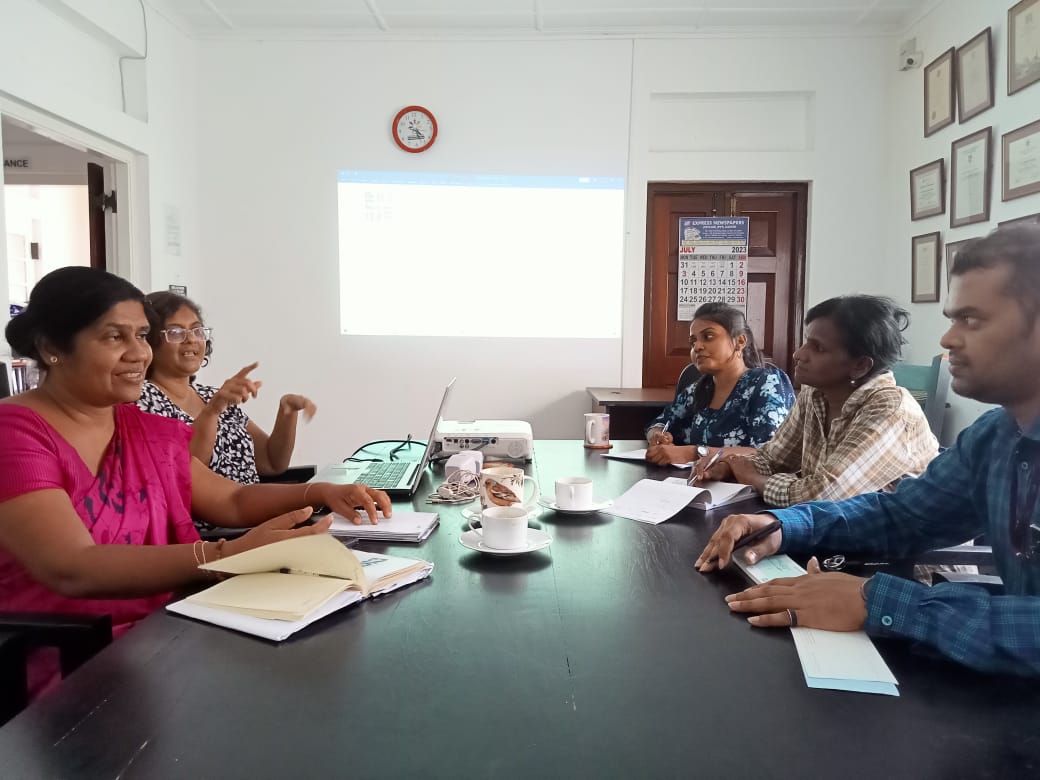
Members of the Federation of Media Employees’ Trade Unions (FMETU) discuss a national action plan to strengthen the rights of media workers across the Island, under the IFJ’s Union to Union strengthening program. Inequality remains rife in Sri Lanka’s media, with financial woes revealing contours of sexist attitudes in management. Credit: FMETU
Expendable women?
Women journalists continue to outnumber their male counterparts in most newsrooms but at the management and newsroom leadership level, their representation is inadequate. Both the pandemic and financial crisis left an indelible mark on the women in media, as they were the first to be laid off. Since the pandemic, through both ‘voluntary’ retirement packages and other layoff mechanisms, women have been the first to lose their media jobs. This gender-based discriminatory practice driven by financial constraints is impacting women’s right to employment and work safety.
Women in mainstream newsrooms continue to face challenges, with some media institutions not paying women equal wages for equal work, and the ever-present issues of safety at the workplace, sexual harassment and fewer opportunities for career advancement.
However, despite the increase in YouTubers and media start-ups, only a few women are visible in the digital start up sphere, succeeding and expanding their sphere of influence, an issue underscored by less access to technology.
In April 2023, a television news presenter Ishara Dewendra resigned from her position at Independent Television Network (ITN) alleging sexual harassment by a top ITN official. South Asian Women in Media, Sri Lanka (SAWM) and the Federation of Media Employees’ Trade Unions (FMETU) came out in support of Dewendra and demanded an independent probe. An investigation was launched with an external investigator to lead the process but has not seen effective closure.
Rightward shift
In several instances, authorities came down on faith leaders, artistes, protestors and even writers for allegedly injuring religious sentiments of the people. Creative spaces such as theatre and poetry too came under the heavy arm of law enforcement, raisings concerns of threats to free speech. The regime leans strongly towards authoritarian crackdowns rather than engage with dissent. The current conduct of the police department is similar to the period of war when media muzzling was a regular practice.
In the year under review, the police largely adopted a curb-and-control approach in violation of fundamental freedoms of journalists to practice their craft and the audiences’ right to receive information. Several faith leaders too have played a divisive role, driving a deep wedge between ethnic and/or religious communities.
In August, a multi-faith group which included three journalists in eastern Batticaloa were threatened with death and held by a mob led by a Buddhist monk. The journalists were reporting on allegations of encroachment of land belonging to Tamil farmers. Sword-yielding villagers forced the journalists to delete the footage. In May 2023, Ven. Rajangane Saddhatissa Thera, a Buddhist monk, was arrested for statements causing ethnic and religious disharmony and was released in July.
Sri Lanka has been using a combination of penal provisions and the ICCPR Act to detain/arrest persons on charges of causing religious disharmony/ethnic tensions together with the draconian Prevention of Terrorism Act (PTA) which had been excessively used to undermine fundamental rights during the years of violent conflict.
On May 28, 2023, stand-up comedian Natasha Edirisooriya was arrested on charges of insulting Buddhism. Edirisooriya was arrested at the Katunayake Airport based on complaints made by Buddhist monks and others regarding her performance at a comedy show. She was charged under Article 3 of the ICCPR and Article 91(a) of the Penal Code. Edirisooriya’s arrest sparked a huge controversy, and the matter was referred to in the Universal Periodic Review statement in July 2023.
In granting bail to Edirisooriya, the court declared that there was no evidence that subsequent to her performance its audience had engaged in any hostility or violence in relation to the target group. It also said that the mere hurting of feelings, causing of defamation and making of a reckless or irresponsible statement by itself does not constitute a violation under the ICCPR law. This court order holds hope that the law will not be extensively misused to curb free speech.
On May 31 2003, the CID also arrested Bruno Diwakara, a social media activist, for posting Edirisooriya’s performance on his YouTube channel and was remanded until June 7. Two comedians, Lakmal Weerasuriya and Sahan Arosha, popularly known as ‘Lakai Sikai’ received threats from unidentified persons for attending Edirisooriya’s performance and laughing during the show. They have lodged a complaint with the CID for being targets of hate merely on the basis of attending a comedy show.
An investigation was launched against vocalist Umara Sinhawansha for her alleged distortion of the national anthem including the mispronunciation of words. As one activist noted, it was a case of a country “high on nationalism, poor on rights.”
Meanwhile, a complaint was lodged with the CID in June against Hiru and Derana television channels and Dasata Lanka and Madhyawediya websites for the publication of news allegedly with intent to sow seeds of religious disharmony. But such action is rare as the mainstream and social media remain replete with content that drives ethnic and religious tension.
Along with the existing Sinhala nationalism, the Hashtag Generation, an activist group of tech-savvy, socially conscious Sri Lankans, has noted a rising influence of Hindutva, or Hindu extremism, especially in the North and East of the island, exacerbating the existing divide with the Sinhala dominated South. “Simultaneously, social media content, pages, and accounts promoting Hinduism, along with expressions of negative and at times extremist sentiments towards other religions, have become increasingly visible in the region, particularly targeting Christian movements on various platforms since 2021,” noted the group.
The police largely adopted a curb-and-control approach in violation of fundamental freedoms of journalists to practice their craft and the audiences’ right to receive information.

Members of the Sri Lanka Working Journalists Association (SLWJA) present a research paper on violence against journalists during the Aragalaya, or struggle, in 2022 to representatives from branches of the Sri Lankan armed forces on June 5, 2023. Many challenges to freedom of expression in Sri Lanka have emerged in the context of the protests, with authorities pursuing a reactionary crackdown on freedom of expression in its wake. Credit: SLWJA
Evolving media
The digital content platforms continued to flourish and serve as conversation starters with more people using the new spaces to express opinion. However, following the crackdown on YouTubers and influencers associated with the 2022 protest movement, analysts observe that content is largely toned down. While there were no social media bans, the regime has managed to create a chilling effect with the introduction of the much-criticised Online Safety Act which effectively curbs free expression online, a space where the country’s youth most engage, specially politically.
Law enforcement officials continued to intimidate people including journalists for their social media posts. While 2023 showed a slight improvement, compared to 2022, freedom of expression online remains highly threatened in Sri Lanka.
In November 2023, in a setback to transparent governance, the Speaker of Parliament prohibited live streaming of parliamentary sessions via social media, one of the main ways in which people learnt about developments inside the legislature.
Unfree speech
Persons linked to the Aragalaya movement continued to be targeted by the law enforcement authorities and hate crimes were fuelled at times by religious persons, while at times, journalists were at the receiving end. Law enforcement agencies were often seen placing themselves as adversaries to the media community, preventing journalists from carrying out reporting activities, and showing brute force as in the case of journalist Tharindu Uduwaragedara.
Nineteen-year-old Udith Madhubhashana from Eppawala, Anuradhapura, was remanded for five days in September 2023 for publishing a post purportedly threatening President Wickremesinghe ahead of a presidential visit to Eppawala. That same month, CID arrested Ramzy Razeek under the ICCPR Act for a Facebook post created by him to counter accusations targeting the Muslim community for spreading the coronavirus. Razeek was faulted for engaging in ideological war but was acquitted in the absence of tangible evidence.
Law enforcement officials continued to arrest, detain, and intimidate people, including journalists, for online posts related to the Aragalaya by using the current Prevention of Terrorism Act (PTA) and the ICCPR. Authorities also moved drafts of the Broadcasting Regulatory Bill and a counterterror law containing provisions that could impact the rights of free expression and assembly.
In January 2024, pastor Jerome Fernando who was arrested in December 2023 for allegedly making derogatory remarks on Buddhism was released on bail. Fernando was also trolled for his comments and had to flee the island temporarily.
Meanwhile, a recently introduced ambitious anti-narcotics program dubbed ‘Yukthiya’ (Justice) has come under severe criticism for targeting dissenters under the guise of a crackdown on narcotics.
Long arm of the law
The government in Sri Lanka has introduced draft laws designed to control both freedom of assembly and expression while utilising existing laws to a maximum. The laws have come in handy to further shrink the limited civic space in Sri Lanka, both online and offline.
In January, the government rushed through the Online Safety Act (OSA), introducing stringent control over online free expression. The law creates a new commission with powers to define, regulate and prosecute the production of ‘fake statements.’
The powerful five-member commission will have direct presidential appointees, immediately diluting its independence. The commission will enjoy exclusive powers to decide on false content and take prohibitive action, including issuing of directives to internet service providers (ISPs) to restrict or remove access to such statements or sites, and to investigate and prosecute violators.
In September 2023, the International Commission of Jurists (ICJ) stated that the Online Safety Bill would pose a serious threat to freedom of expression and in October, the United Nations Human Rights Commissioner echoed the same warning. The cabinet went into defensive mode and announced that the purpose of the law was to protect the general public from harm caused by the spread of fake news and disinformation through the internet. The law has received blistering criticism from the human rights community both locally and overseas.
The Asia Internet Coalition (AIC), a collective of major tech companies, expressed strong opposition to the draft law and warned against possible withdrawal by popular social media platforms, in turn severely impacting both free speech but also e-commerce.
A record number of about 50 petitions were filed challenging the validity of the OSA.
In June 2023, a draft outline of a proposed law to regulate the electronic media was shared with the Broadcasters’ Guild of Sri Lanka to elicit their responses. Despite a presidential pledge to not use the proposed law to curtail freedom of expression or unduly control the electronic media, especially the state broadcasters, there are serious concerns about both the timing and intent of the proposed law.
In August 2023, the Supreme Court commenced hearing six fundamental rights petitions against the draft bill titled Contempt of Judicial Authority or an Institution. The petitioners say that the provisions of the proposed law impact the right to free expression. Although the court determined that it required a two thirds majority to pass the law due to its inconsistency with the constitution, in February 2024, it became law through a special majority. Its proponents hailed the law as a comprehensive legal framework to deal with matters relating to contempt of court, including specific laws on contempt and the procedures to be followed in contempt cases.
The cabinet also approved a draft Anti-Terror bill in September 2023 after the earlier draft presented to parliament in May 2023 was withdrawn due to strong objections regarding its potential impact on fundamental rights. The amended draft too has been critiqued by rights organisations in Sri Lanka.
Following the crackdown on YouTubers and influencers associated with the 2022 protest movement, analysts observe that content is largely toned down.
In September 2023, the International Commission of Jurists (ICJ) stated that the Online Safety Bill would pose a serious threat to freedom of expression and in October, the United Nations Human Rights Commissioner echoed the same warning.
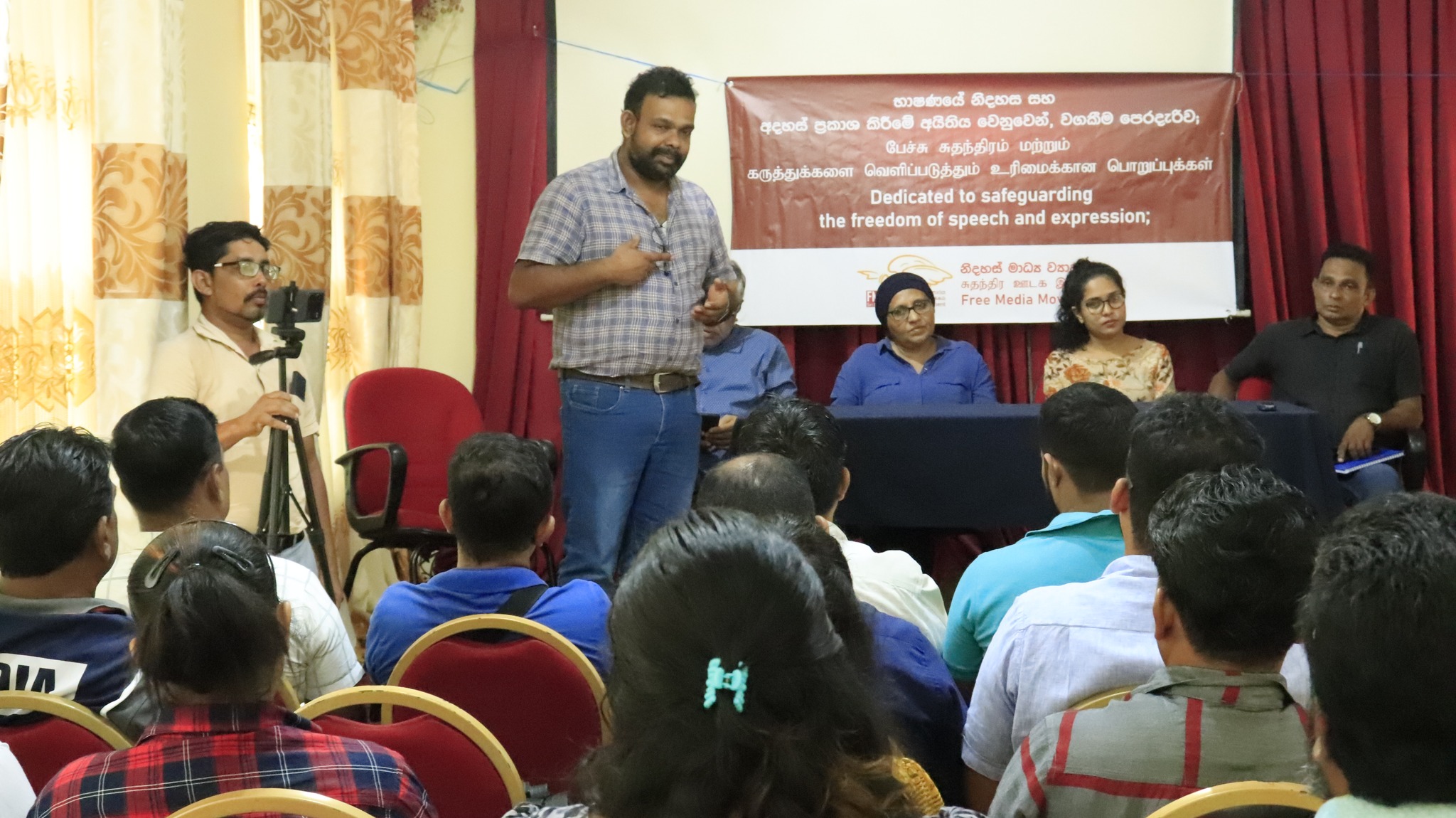
Lasantha De Silva, Secretary of the Free Media Movement, speaks on legal challenges to press freedom in Trincomalee on March 9, 2024. This past year, Sri Lankan authorities rushed through the widely condemned Online Safety Bill, while stewing on a draconian Anti-Terror bill, despite numerous challenges from rights bodies and press unions. Credit: FMM
Rise and fall of digital media
During the Aragalaya protest movement, there was surge of interest in digital platforms with digital activism reaching its peak. While they continue to enjoy public engagement, some of the platforms have recorded a swift decline in popularity. There were content creators, some of them influencers, who began using this space both for digital content and for mobilisation purposes during the political crisis.
While there are popular and recognised channels, many are solo operations, inadequately resourced and lacking content value. They have also been criticised for shadow boxing, representing political interests and for lacking content diversity.
With the decline of legacy media, a few media start-ups have come up, many of them video platforms and websites. While the start-up culture provides for independent journalism, there are very few content creators who offer an alternative to the mainstream in terms of content. There have been questions on the liberal lacing of news with views and the lack of opinion diversity on the new platforms. Unverified information going viral via these platforms has also been a concern. In September 2023, the Minister of Justice sought LKR 500 million (around USD 16,000) from Keerthi Ratnayake, editor of the nationalalert.lk website for damage caused by the publication of alleged defamatory news on his website.
Disinformation and misinformation
In 2023, misinformation and disinformation trends were deeply linked to the island’s political economy with a sprinkling of fake news linked to identity and religion.
Much of the misinformation was targeted at economic policies including tax controversies such as misrepresentation of common levies, and this ‘news’ drew panic responses. There were similar hoaxes indicating how the economic collapse made major companies withdraw from the island economy and distorted statistics on food security were circulated.
Misinformation campaigns about electricity connections being disconnected due to unpaid bills were circulated, complete with false and exaggerated claims about China-headquartered petroleum company SINOPEC, the new entrant to Sri Lanka’s domestic fuel business.
Several leading politicians were targets of misinformation campaigns including President Ranil Wickremesinghe, Opposition leader Sajith Premadasa, and National People’s Power (NPP) leader Anura Kumara Dissanayake. According to analysis by the Hashtag Generation, misinformation campaigns often demonstrated a pro-NPP leaning. This included instances where certain infographics claiming to be survey results suggested a high probability of NPP securing more than 50 per cent of the votes in upcoming national elections and attributing them to reputed research organisations. Other key targets of misinformation as well as smear campaigns on social media in 2023 included US Ambassador to Sri Lanka Julie Chung and former president of the bar Association of Sri Lanka (BASL), Saliya Pieris.
The social media space also saw an influx of misinformation related to the Hamas-Israel war, highlighting the interconnected nature of misinformation narratives. However, despite its significant ability to influence public thinking in the global misinformation landscape, AI-related misinformation remained relatively low in Sri Lanka.
Drawing heavy criticism from home and abroad, the government replaced the Digital Security Act (DSA) with another law, the Cyber Security Act (CSA).
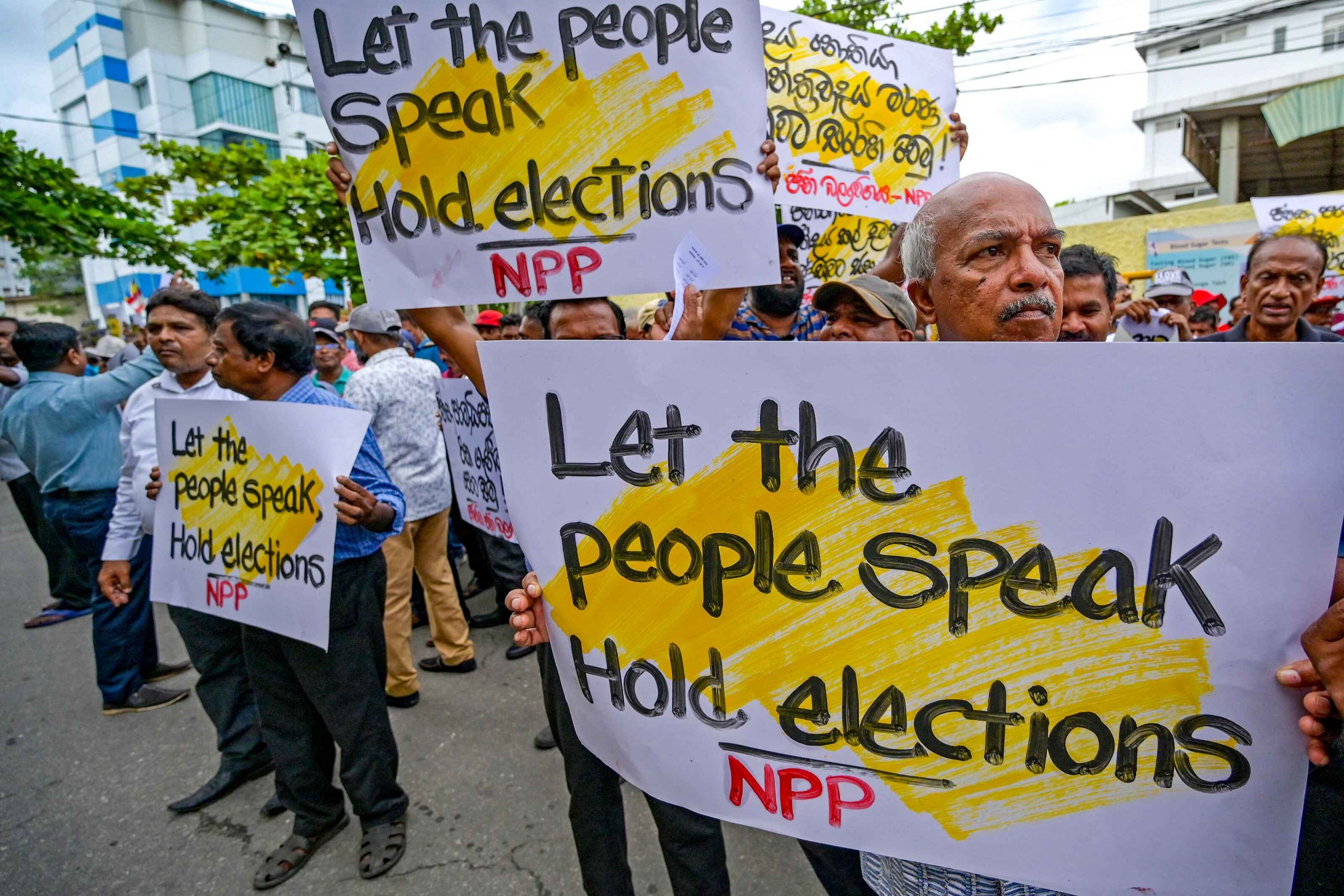
Anti-government demonstrators protest as they urge to hold local elections, near the Elections Secretariat in Colombo on June 8, 2023. Despite enormous challenges to democracy and free expression, solidarity within the media and beyond has reached new highs, with historic alliances and collectives formed to fight challenges to fundamental freedoms. Credit: Ishara S. Kodikara / AFP
International obligations
Sri Lanka was knuckle-rapped for the spate of arbitrary arrests, crackdowns and moves to introduce oppressive laws in an attempt to curb public anger and dissent. Various UN agencies have expressed concern over Sri Lanka’s alarming decline in free speech and the use of existing laws including the ICCPR Act which should be used for the protection of rights, not to hound dissenters. Several laws in the pipeline including the proposed counter terrorism bill and the recently introduced Online Safety Act have received international criticisms for violating state obligations to uphold fundamental freedoms including free speech and assembly. There had been calls to demonstrate accountability and transitional justice without trying to curtail fundamental freedoms of the people.
On May 22, 2023, ten UN special rapporteurs wrote to President Ranil Wickremesinghe cautioning against the ill-effects of the proposed anti-terror bill on human rights and free expression, highlighting the need for Sri Lanka to demonstrate compliance with international human rights laws and obligations. The UN Human Rights Commissioner’s Office also warned against repercussions for moving repressive laws to suppress political opposition.
In September 2024, a 2021 resolution before the UN Human Rights Council on reconciliation, accountability and human rights in Sri Lanka will come up for renewal.
Collaborative strategies
Despite the oppressive political climate, there were several interventions to thwart the authoritarian overreach of the state. Civil society groups filed a record number of petitions challenging the draft anti-terror and online safety bills, the latter now a law. Fresh calls are being made to withdraw the Online Safety Act in its entirety. Besides legal action, there were various protests ranging from public events to petitioning, in a show of solidarity and defiance.
Civil society effectively collaborated with the Asia Internet Coalition to express strong opposition to the Online Safety Act with the possibility of key tech platforms withdrawing their services from Sri Lanka, which will also have direct economic implications.
Journalist groups also came together to discuss common approaches to oppose government moves to curb free expression and to drive fear through crackdowns and new laws. In February 2024, a collective of several media organisations including the Sri Lanka Working Journalists Association, the Free Media Movement, the Sri Lanka Muslim Media Forum, the Tamil Media Alliance, the Sri Lanka Young Journalists’ Association and the South Asian Free Media Association-Sri Lanka Chapter, wrote to the Speaker of the parliament, registering their strong opposition to “any attempts to summon journalists before the Committee on Parliamentary Privileges for fulfilling their journalistic and social responsibility obligations.” The Media Organizations Collective urged the Speaker to “not to contribute to the government’s efforts to suppress the media using the powers and privileges of Parliament.”
Solidarity and resistance
Sri Lanka’s fragile democracy reached a dangerous low in freedom of expression, right to assembly and to protest, as authoritarian tendencies increased during the year under review. The 2022 protest movement was a watershed moment in recent Sri Lankan history for it renewed people’s spirit to demand accountability and protect fundamental freedoms.
The depth of public anger and urgency in ousting an elected president resulted in the Wickremesinghe administration resorting to extreme measures to control the situation, which included a combination of brutal crackdowns and intimidation as well as criminalising freedom on the net. The government has used multiple legal instruments to crush dissent and to silence digital content creators and digital activism, a trend likely to continue in this year of elections.
The current “legal architectural repression” will continue, and journalists will become more vulnerable. In the process, citizens have become more active, especially in the digital space. It is unlikely that despite a chilling effect of a new law, that resistance will be wiped out.
However, the charged atmosphere increases the vulnerability of journalists, influencers, and activists. In this context, journalists will benefit from digital safety training and the availability of legal support.
Pressure on the government to comply with international and constitutional obligations to protect freedom of expression and the safety of journalists is yet to be effectively built up.
Sri Lanka lacks legislative protection to ensures the safety of media workers, journalists and also their sources. Lobbying for such a law would be appropriate as the state increasingly turns on the messenger.
Media groups should organise more effectively and shed their differences to improve industry standards and defend the right to practice their craft in a highly oppressive climate.
